Lesson Fifteen
2022年五年级英语下册Unit3WritingHomeLesson15SendingthePost

6. How to get to the Garden Hotel?(在文中找出同义句)
___H_o_w__c_a_n__I_g_e_t_t_o_t_h_e_G__a_r_d_e_n_H__o_t_el_,_p_l_e_a_se_?____
4. The bookshop is ___f_a_r___ from the zoo.
五、请为下列句子选择相应的答语。 ( D )1. Where is the park? ( E )2. How much are the pictures?
A. Thank you! B. Yes, but not now. C. He's sleeping. D. Turn right at the traffic lights. E. They are ten yuan.
六、仿照例子,对画线部分提问。 例:It's fifteen yuan. How much is it? 1. The post office is near the zoo. ___W__h_e_r_e_i_s_t_h_e_p_o_s_t_o_f_f_ic_e_?____________
2. I'll take three pens. ____H_o_w__m__a_n_y__p_e_n_s_w_i_ll__y_o_u_t_a_k_e_?______
B. write; to
C. writing; to
方法点拨:本题用固定搭配法解答。take one's picture给某人拍照,是固定搭配。
( A )5. You can see the computer room________
the left.
A. on
lesson fifteen
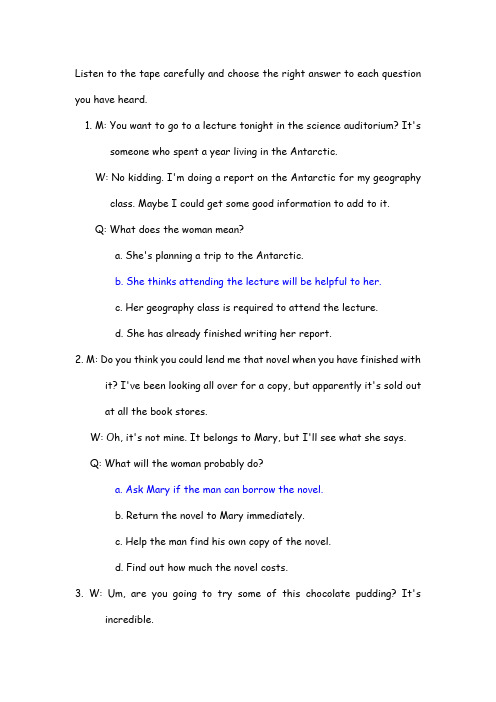
Listen to the tape carefully and choose the right answer to each question you have heard.1. M: You want to go to a lecture tonight in the science auditorium? It'ssomeone who spent a year living in the Antarctic.W: No kidding. I'm doing a report on the Antarctic for my geography class. Maybe I could get some good information to add to it.Q: What does the woman mean?a. She's planning a trip to the Antarctic.b. She thinks attending the lecture will be helpful to her.c. Her geography class is required to attend the lecture.d. She has already finished writing her report.2. M: Do you think you could lend me that novel when you have finished withit? I've been looking all over for a copy, but apparently it's sold out at all the book stores.W: Oh, it's not mine. It belongs to Mary, but I'll see what she says.Q: What will the woman probably do?a. Ask Mary if the man can borrow the novel.b. Return the novel to Mary immediately.c. Help the man find his own copy of the novel.d. Find out how much the novel costs.3. W: Um, are you going to try some of this chocolate pudding? It'sincredible.M: Well, to be honest with you, I've never been a big fan of chocolate. Q: What can be inferred from the man?a. He has already tasted the chocolate pudding.b. Chocolate is his favorite flavor.c. He doesn't want any chocolate pudding.d. There is no more chocolate pudding left.4. W: Why don't we go catch the new American film at the Market StreetCinema?M: That's a little out of the way(remote: far from a populated area or difficult to get to), don't you think?Q: What does the man suggest they do?a. The cinema is too far away.b. Wait until later to see the movie.c. Consider seeing an English version of the movie.d. Call the Market Street Cinema to see what time the moviestarts.e.g. This restaurant is a little out of the way.5. M: The stew is delicious. I'd like to be able to make it myself.W: Why not? You can get all the ingredients at any supermarket. Here, let me get a pen and a slip of paper.Q: What will the woman probably do next?a. Purchase some ingredients.b. Give the man a recipe.c. Write down the directions to the supermarket.d. Check to see if the stew is ready.What is your recipe for success?你取得成功有什麽窍门?6. W: I am getting hungry. I think we should go to dinner soon.M: Me, too. All I had for lunch was a chocolate bar.Q: What does the man mean?a. He bought the woman some chocolates.b. He will get hungry soon.c. He's also ready for dinner.d. He wants to buy some candy.7. M: Helen and I are thinking of renting a house at the beach in June. Areyou interested?W: June? I guess it's cheaper then. But do you really think it will be warm enough?Q: What does the woman think of the man's idea?a. She's very interested in the idea.b. She thinks they should invite more people.c. She can't afford a holiday in June.d. She's doubtful about the weather in June.8. M: Those airplanes are certainly loud.W: Aren't they, though?Q: What does the woman think about the airplanes?a. They are extremely noisy.b. They should have arrived by now.c. They should be allowed to fly there.d. They are not on a definite schedule.9. W: I'd really like to go to the concert tonight. But I don't know if I canspare the time.M: Music always relaxes me. It might be worth it in the long run.Q: What does the man suggest the woman do?a. Go to the library.b. Check her calendar.c. Attend the performance.d. Get some exercise.10. M: I have a collect call(对方付费电话) from Mike Peterson.W: I'll accept the charges.Q: What will the woman do?a. She will charge the man.b. She'll pay for the call.c. She'11 charge the purchase.d. She'11 call Mike back.11. M: Joe just went down to the engineering meeting.W: Where is it?Q: What does the woman want to know?a. Where the meeting is being held.b. Where Joe will meet her.c. What the topic of the meeting is.d. What Joe was wearing.12. M: I'd like to make an appointment with the doctor for tomorrow.W: Unfortunately, he's completely booked.Q: What information can you get about the doctor?a. The doctor has stopped seeing new patients.b. The doctor's office will be closed tomorrow.c. The doctor's schedule is full tomorrow.d. The doctor can see the man tomorrow.13. M: I don't know if I'll be able to turn in my economics paper on time.W: Haven't you heard that the professor gave us a week's extension on it?Q: How do you interpret what the woman says?a. She hasn't heard from the professor for a week.b. The class has extra time to complete the assignment.c. She just found out about the economics paper.d. She won't see the professor until next week.14. W: Nobody told me that Bill was in the hospital.M: Sorry. I meant to give you a call when I found out, but it slipped my mind.Q: Why does the man apologize to the woman?a. He didn't know what hospital Bill was in.b. He took Bill to the hospital.c. He hurt Bill.d. He forgot to tell the woman.Sorry, I'm new in the hotel. And the room number slipped my mind for the moment.很抱歉,我是新近住进来的,现在一时想不起房号了。
新概念一 lesson15-16 课文加语法课件
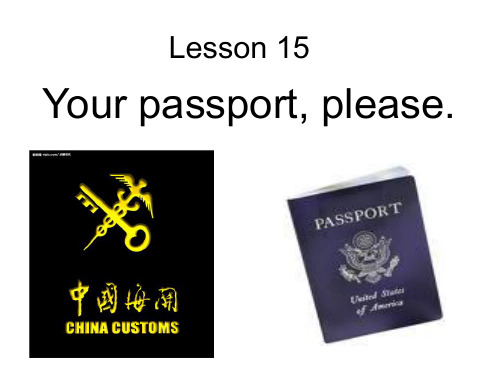
本课重点语法(一)
a box --- boxes a fish --- fishes a watch --- watches
名词复数的规则变化 1.一般情况下直接在词尾加 “s”
读音:清(无声)/s/ cups 浊(有声)/z/ dogs 元(有声)/z/ umbrellas /t/后/ts/ cats tickets /d/后/dz/ beds birds 单词以es结尾读/ɪz/cases
男性 male [meil] 女性 female ['fi:meil]
Super memory!
customs officer girl
friend passport tourist Norwegian
Listening
Now, I want you to listening to the tape, find out the following information:
1.Where? At the customs 2.Who? Customs officers and girls
3.Are the girls’ friends Danish?
No ,they aren’t. They are Norwegian. 4.What color is the girls’ cases? Their cases are brown.
注 意 做 笔 记 哦!
本课重点语法(二)
2. 其它(职业): 单→复 student → students
teacher → teachers engineer → engineers
注 意 做 笔 记 哦!
单复数同形 Swedish Danish Norwegian Chinese Japanese 单复数同形
科普版四年级上 英语 单词卡片

Lesson12 词汇表 together [təˈɡeðə(r)] 一起 cut [kʌt] 切,砍 have to [ˈhæ v tə] 不得不 You're welcome. [jʊə(r) ˈwelkəm] 不客气。
Lesson6 词汇表 from [frɒm] 从,来自 brown [braun] 棕色的 now [nau] 现在
Lesson7 词汇表 teacher ['ti:tʃə] 教师 worker ['wə:kə] 工人 woman ['wumən] 妇女 (复women['wimin])
Lesson7 词汇表 doctor [ˈdɒktə(r)] 医生 or [ɔ:] 或者,否则 nurse [nə:s] 护士
Lesson1 词汇表 friend [frend] 朋友 Swim [swim] 游泳 head [hence [dɑ:ns] 跳舞 touch [tʌtʃ] 触摸 bend [bend] 弯曲
Lesson2 词汇表 desk [desk] 书桌 cup [kʌp] 茶杯 clock [klɔk] 钟 guess [ges] 猜
Lesson9 词汇表 eleven [i'levn] 十一 twelve ['twelv] 十二 thirteen [ˌθə:'ti:n] 十三 fifteen [ˌfif'ti:n] 十五
Lesson9 词汇表 over ['əuvə] 在那边;结束 goat [gəut] 山羊 over there 在那边 how many 多少
Lesson3 词汇表 book [buk]书 good [gud] 好的 pen [pen] 钢笔 pencil ['pensl] 铅笔 pencil box 文具盒
自考综合英语(一)单词整理带例句
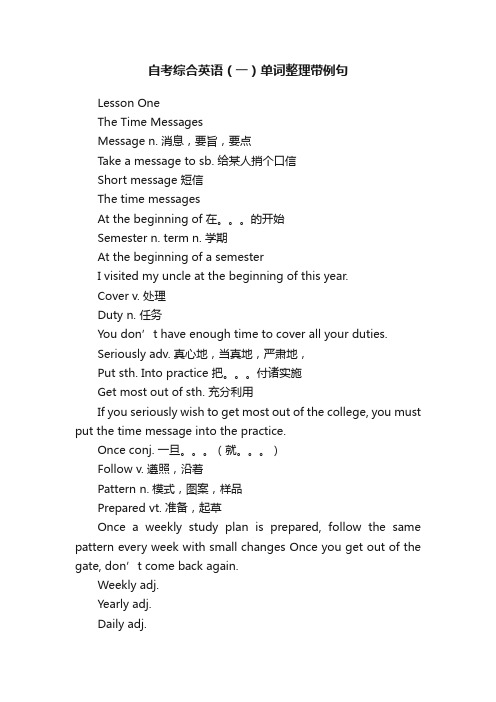
自考综合英语(一)单词整理带例句Lesson OneThe Time MessagesMessage n. 消息,要旨,要点Take a message to sb. 给某人捎个口信Short message 短信The time messagesAt the beginning of 在。
的开始Semester n. term n. 学期At the beginning of a semesterI visited my uncle at the beginning of this year.Cover v. 处理Duty n. 任务You don’t have enough time to cover all your duties.Seriously adv. 真心地,当真地,严肃地,Put sth. Into practice 把。
付诸实施Get most out of sth. 充分利用If you seriously wish to get most out of the college, you must put the time message into the practice.Once conj. 一旦。
(就。
)Follow v. 遵照,沿着Pattern n. 模式,图案,样品Prepared vt. 准备,起草Once a weekly study plan is prepared, follow the same pattern every week with small changes Once you get out of the gate, don’t come back again.Weekly adj.Yearly adj.Daily adj.The nurse attended the patient daily.Realistic adj. 现实可行的Be realistic, allow for unexpected things.Essay n. 作文,短文Quiz n. 考查,测验Often you know from experience how long it takes you to write a short essay, to study for a quizUpset v. 打乱,打翻adj. 伤心,(同义词sad)Otherwise adv. 否则Otherwise your entire plan may be upsetAbility n. 能力,才智Grade n. 分数Achieve v. 获得How much study time you plan for each classroom hour depends on four things:(1) your ability,(2) the difficulty of the class, (3) the grades you hope to achieve, and (4) how well you use your study time.Flexible adj. 灵活的Keep your plan flexibleOn the basis of 在。
现代大学英语精读旧版目录
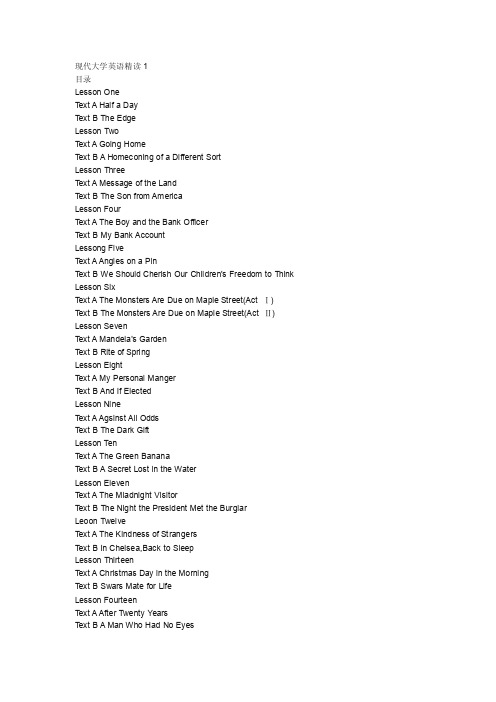
现代大学英语精读1目录Lesson OneT ext A Half a DayT ext B The EdgeLesson TwoT ext A Going HomeT ext B A Homeconing of a Different SortLesson ThreeT ext A Message of the LandT ext B The Son from AmericaLesson FourT ext A The Boy and the Bank OfficerT ext B My Bank AccountLessong FiveT ext A Angles on a PinT ext B We Should Cherish Our Children's Freedom to Think Lesson SixT ext A The Monsters Are Due on Maple Street(Act Ⅰ)T ext B The Monsters Are Due on Maple Street(Act Ⅱ) Lesson SevenT ext A Mandela's GardenT ext B Rite of SpringLesson EightT ext A My Personal MangerT ext B And If ElectedLesson NineT ext A Agsinst All OddsT ext B The Dark GiftLesson TenT ext A The Green BananaT ext B A Secret Lost in the WaterLesson ElevenT ext A The Miadnight VisitorT ext B The Night the President Met the BurglarLeoon TwelveT ext A The Kindness of StrangersT ext B In Chelsea,Back to SleepLesson ThirteenT ext A Christmas Day in the MorningT ext B Swars Mate for LifeLesson FourteenT ext A After Twenty YearsT ext B A Man Who Had No EyesLesson FifteenT ext A T ouched by the MoonT ext B A Plea for Our Planet~~~~~~~~~~~~~~~~~~~~~~~~~~~~~~~~~~~~~~~~~~~~~~~~~~~~~ 现代大学英语精读2目录Lesson One Another School Year-What For?Lesson Two Mahegun My BrotherLesson Three More Crime and Less PunishmentLesson Four The Nightingale and the RoseLesson Six The Man in The WaterLesson Seven The Greatest InventionLesson Eight Paychologically SpeakingLesson Ten The Richer,the PoorerLesson Eleven You Have to Get Me Out of HereLesson Twelve Confessions of a Miseducated ManLesson Fourteen Space Shuttle ChallengerLesson Fifteen The Riddle of Time~~~~~~~~~~~~~~~~~~~~~~~~~~~~~~~~~~~~~~~~~~~~~~~~~~~~~ 现代大学英语精读3目录Plan of the BookAcknowledgementT extsLesson OneT ext A Your College YearsT ext B Preparing for CollegeLesson TwoT ext A Discovery of a FatherT ext B The Last Word Was LoveLesson ThreeT ext A Michael Dell’s Two-Billion-Dollar DreamT ext B Would You Know a Computer If You Met One?Lesson FourT ext A Wisdom of Bear WoodT ext B Baby BirdsLesson FiveT ext A Twelve Angry Men (Part One)T ext B Shot Actress — Full Story (Part I)Lesson SixT ext A Twelve Angry Men (Part T wo)T ext B Shot Actress — Full Story (Part I)Lesson SevenT ext A The RivalsT ext B The Open WindowLesson EightT ext A "We’re Only Human"T ext B Button, ButtonLesson NineT ext A A Dill PickleT ext B The Valentine GenerationLesson TenT ext A Diogenes and AlexanderT ext B A Horseman in the SkyLesson ElevenT ext A Silent SpringT ext B Of Man and the Stream of TimeLesson TwelveT ext A The Needs that Drive Us AllT ext B Maslow’s Hierarchy of NeedsLesson ThirteenT ext A In My DayT ext B My Grandmother, the Bag LadyLesson FourteenT ext A Mercy at AppomattoxT ext B Grant and Lee: A Study in ContrastsLesson FifteenT ext A The President as Corporate SalesmanT ext B Our Leaders Don’t Know BestVocabulary ListIdiomatic Expressions and Collocations~~~~~~~~~~~~~~~~~~~~~~~~~~~~~~~~~~~~~~~~~~~~~~~~~~~~~ 现代大学英语精读4目录Plan of the BookAcknowledgementT extLesson OneT ext A Thinking as a HobbyT ext B The Pleasures of LearningLesson TwoT ext A Waiting for the PoliceT ext B The Hitch—hikerLesson ThreeT ext A Why Historians DisagreeT ext B The Third ManLesson FourT ext A A Drink in the PassageT ext B The BenchLesson FiveT ext A Man of the MomentT ext B Climbing the Mountain of SuccessLesson SixT ext A Groundless BeliefsT ext B Corn——pone OpinionsLesson SevenT ext A Spring SowingT ext B The Earth POetLesson EightT ext A Globalization’S Dual PowerT ext B The International Language of GesturesLesson Nine。
lesson15-16 Your passports,please.
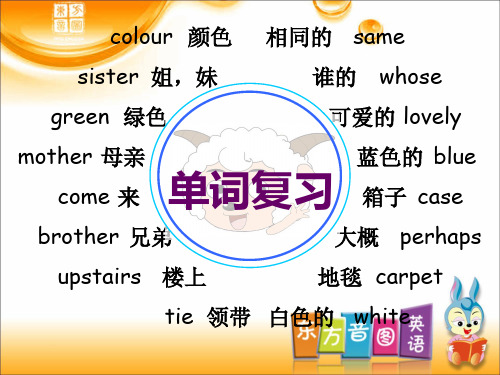
sister 姐,妹
谁的 whose
green 绿色
可爱的 lovely
mother 母亲
蓝色的 blue
单词复习 come 来
箱子 case
brother 兄弟
大概 perhaps
upstairs 楼上
地毯 carpet
tie 领带 白色的 white
hat 帽子 his 他的 smart 时髦的 her 她的
dog 狗 catch 抓住 father 父亲 blouse 女衬衫
课文复习
1.你的新连衣裙是什么颜色的?
What colour is your new dress?
2.是绿色的。 It’s green. 3.到楼上来看看吧。
Come upstairs and see it.
4.瞧,就是这件。 Look! Here it is!
1. customs ̸ 'kʌstəmz ̸ n. 海关
2. officer ̸ 'ɔfisə ̸ n. 官员 海关官员 customs officer 3. girl ̸ 'gəːl ̸ n. 女孩,姑娘
4. Danish ̸ 'deiniʃ ̸ adj. 丹麦的
n. 丹麦人,丹麦语
Denmark n. 丹麦(国名)
I’m a customs officer.
Danish Norwegian Swedish
Q1: What are their nationalities? Q2: What color are their cases?
Listening
Watch the video and try to answer the following questions:
Lesson fifteen
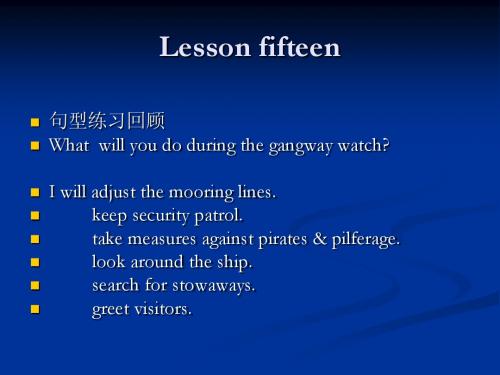
对话对话-思考
What can be used to put out common fire? water foam co2 dry powder ......etc.
课文ቤተ መጻሕፍቲ ባይዱ
emergency power supply emergency steering gear the fuel oil system the aids to navigation the fire control plan the fire-fighting equipment : firefire lines fire hoses fire hydrants fire pumps fire extinguishers the life-saving equipment : lifelife boats life rafts life jackets life buoys
作业
Page100 Ⅲ Ⅳ
Lesson fifteen
句型练习回顾 What will you do during the gangway watch? I will adjust the mooring lines. keep security patrol. take measures against pirates & pilferage. look around the ship. search for stowaways. greet visitors.
对话
Show me your ID card ,please. But please fill in the sheet, ... This is your boarding pass, ... Pin it on your clothes.
小学英语人教精通版四年级上册教案lesson15
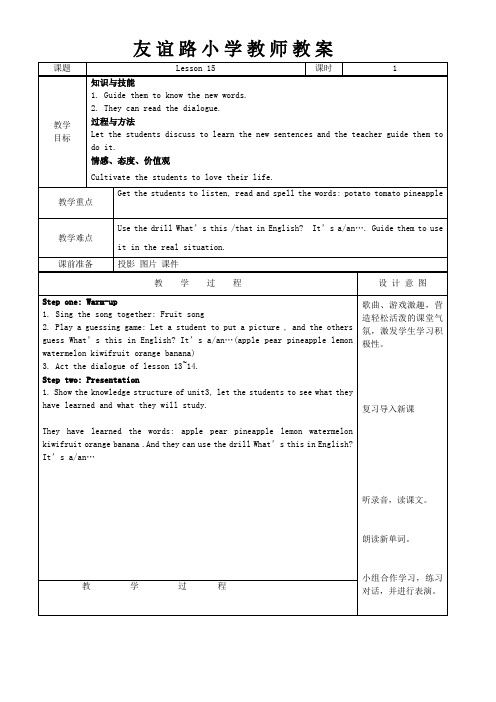
Cultivate the students to love their life.
教学重点
Get the students to listen, read and spell the words: potato tomato pineapple
教学难点
Use the drillWhat’s this /that in English? It’s a/an….Guide them to use it in the real situation.
歌曲、游戏激趣,营造轻松活泼的课堂气氛,激发学生学习积极性。
复习导入新课
听录音,读课文。
朗读新单词。
小组合作学习,练习对话,并进行表演。
鼓励学生运用学过的知识编写新对话,复习巩固新句型的运用。
课堂小结,复习巩固本课所学知识
教 学 过 程
2. Look at the knowledge tree of lesson 15. They need to listen, read and spell the words: potato tomato pineapple And use the drill they have learned into the real condition.
2.Ask andanswereach other, and act the dialogue with the partner.
3.Let’s do.
Step four: Review.
1. Show the knowledge tree of lesson 15. Let the students to review the aim of this lesson. 2.Show the knowledge trees of thisunit.Help the students to review the knowledge structure of the unit. And let them to review what they will grasp.
七年级英语下册知识讲义-Unit 3 Lesson 13-Lesson 15-冀教版
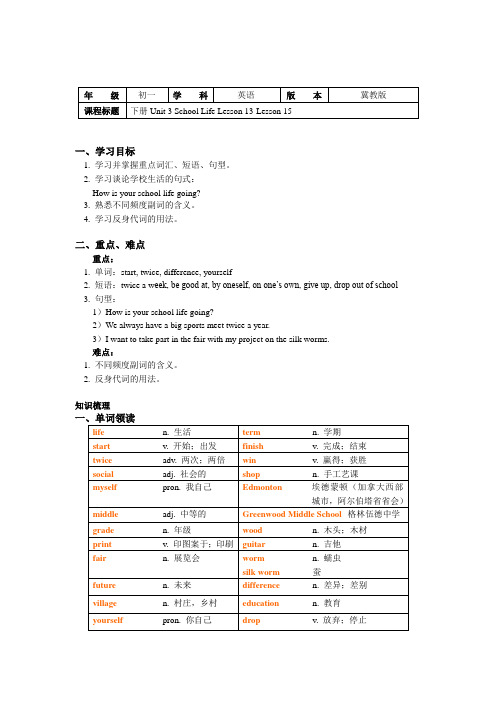
一、学习目标1. 学习并掌握重点词汇、短语、句型。
2. 学习谈论学校生活的句式:How is your school life going?3. 熟悉不同频度副词的含义。
4. 学习反身代词的用法。
二、重点、难点重点:1. 单词:start, twice, difference, yourself2. 短语:twice a w eek, be good at, by oneself, on one’s own, give up, drop out of school3. 句型:1)How is your school life going?2)We always have a big sports meet twice a year.3)I want to take part in the fair with my project on the silk worms.难点:1. 不同频度副词的含义。
2. 反身代词的用法。
知识梳理possible adj. 可能的never adv. 从来没有;决不二、重点单词【单词学习】1. start v. 开始;出发【用法】start既可以用作及物动词,也可以用作不及物动词,表示开始某一动作时,后面可接不定式,也可接动名词。
【例句】We start class at 8:00 in the morning. 我们早上八点钟开始上课。
He starts to work at half past eight every day. 他每天八点半开始工作。
【拓展】1. 意为“开始;发生;发起”时,与begin用法相同,两者可互换。
We begin to do our homework.= We start to do our homework. 我们开始写作业。
2. 表示开始某一动作时,后面接不定式或动名词所表达的意思是相同的。
The child began crying/ to cry. 那小孩开始哭了。
机务英语口语交流大全
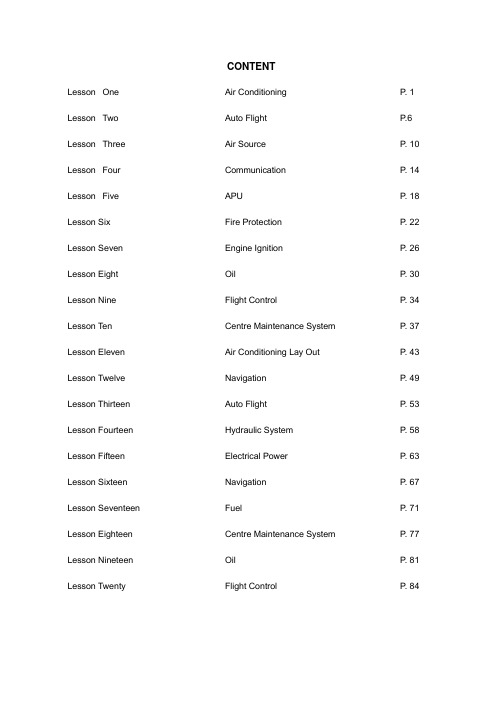
P. 1 P.6 P. 10 P. 14 P. 18 P. 22 P. 26 P. 30 P. 34 P. 37 P. 43 P. 49 P. 53 P. 58 P. 63 P. 67 P. 71 P. 77 P. 81 P. 84
Lesson One Air conditioning System
Electrical power for heating is mainly used in the galleys for ovens and coffee machines. It is also used in anti ice systems to prevent icing of air data probes, water systems and cockpit windows.
Lesson One Lesson Two Lesson Three Lesson Four Lesson Five Lesson Six Lesson Seven Lesson Eight Lesson Nine Lesson Ten Lesson Eleven Lesson Twelve Lesson Thirteen Lesson Fourteen Lesson Fifteen Lesson Sixteen Lesson Seventeen Lesson Eighteen Lesson Nineteen Lesson Twenty
Part one: Read the following passage and memory as much as you can, and then describe the diagram below with your own words.
The air conditioning system supplies pressurization to the whole passenger compartment, the cockpit, all the cargo compartments and the avionic compawo:Read the following passage and memory as much as you can, and then describe the diagram below with your own words.
Lesson Fifteen The Letter “A” (1)
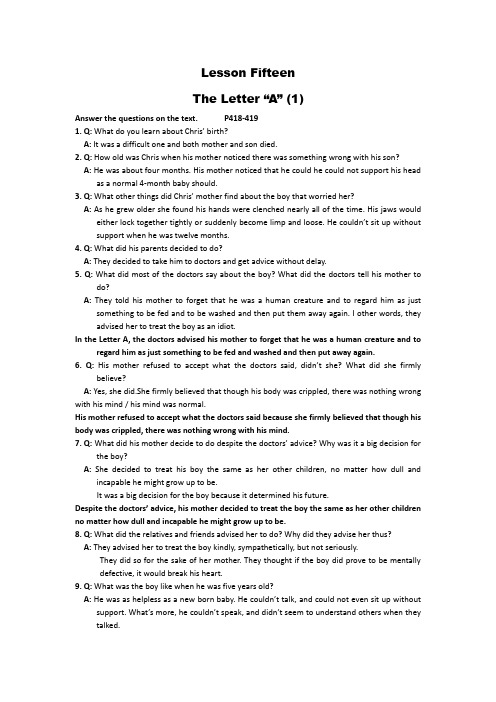
Lesson FifteenThe Letter “A” (1)Answer the questions on the text. P418-4191. Q: What do you learn about Chris’ birth?A: It was a difficult one and both mother and son died.2. Q: How old was Chris when his mother noticed there was something wrong with his son?A: He was about four months. His mother noticed that he could he could not support his head as a normal 4-month baby should.3. Q: What other things did Chris’ mother find about the boy that worried her?A: As he grew older she found his hands were clenched nearly all of the time. His jaws would either lock together tightly or suddenly become limp and loose. He couldn’t sit up without support when he was twelve months.4. Q: What did his parents decided to do?A: They decided to take him to doctors and get advice without delay.5. Q: What did most of the doctors say about the boy? What did the doctors tell his mother todo?A: They told his mother to forget that he was a human creature and to regard him as just something to be fed and to be washed and then put them away again. I other words, they advised her to treat the boy as an idiot.In the Letter A, the doctors advised his mother to forget that he was a human creature and to regard him as just something to be fed and washed and then put away again.6. Q: His mother refused to accept what the doctors said, didn’t she? What did she firmlybelieve?A: Yes, she did.She firmly believed that though his body was crippled, there was nothing wrong with his mind / his mind was normal.His mother refused to accept what the doctors said because she firmly believed that though his body was crippled, there was nothing wrong with his mind.7. Q: What did his mother decide to do despite the doctors’ advice? Why was it a big decision forthe boy?A: She decided to treat his boy the same as her other children, no matter how dull and incapable he might grow up to be.It was a big decision for the boy because it determined his future.Despite the doctors’ advice, his mother decided to treat the boy the same as her other children no matter how dull and incapable he might grow up to be.8. Q: What did the relatives and friends advised her to do? Why did they advise her thus?A: They advised her to treat the boy kindly, sympathetically, but not seriously.They did so for the sake of her mother. They thought if the boy did prove to be mentally defective, it would break his heart.9. Q: What was the boy like when he was five years old?A: He was as helpless as a new born baby. He couldn’t talk, and could not even sit up without support. What’s more, he couldn’t speak, and didn’t seem to understand others when they talked.10. Q: What had his mother been trying to do all those years?A: She had been trying to teach him to communicate.11. Q: What did Chris do that most break her heart? But didn’t lose heart, did she?A: One day she was patiently trying to teach Chris a few words, but he made no sign that he understood her. Instead, he suddenly grasped some of her hair and pulled them out.No, she didn’t.12. Q: What the relatives suggest? What the mother say to the suggestion? What made themhold out against them?A: They suggest putting the boy in a mental hospital / home for idiots.She said firmly that she would never put the boy in a mental hospital / a home for idiots, and that she was sure her son was not an idiot.It was only a mother’s love for her son that gave her strength to hold out against the relatives.Speak on the topic: What were Chri s’ problems as a five-year-old child? P419Chris was not a normal five-year-old (boy). Physically, he couldn’t sit up without support, let alone walk. His head fell sideways. His hands were clenched nearly all of the time. He couldn’t hold things. His fingers twisted and twitched continually. Mentally, it seemed as if he really was an idiot. Although his mother had been trying hard to communicate with him, he looked as if he couldn’t understand what she said to him. He couldn’t speak, nor did he smile pr operly. His relatives came to believe that he was beyond hope.Write a paragraph of about 100 words on the topic: What did Chris’ mother do for him up to the time when he was five? P420When Chris was a little over a year old, his mother began to take him to different doctors. Many told her he was mentally defective and that he was beyond cure. But she firmly believed that her son was not an idiot. She was determined to treat him the same as her other children, and she set out to prove that she was ritht. Patiently she tried to teach him a few words, but the boy never made any sign that he understood her. All the time she had to hold out against her relatives, who insisted that he should not be taken seriously. When Chris was five years old and seemed as hopeless as before, the relatives suggested putting him in a home for idiots, his mother said firmly, “Never!”Translate the following sentences into English. P4211.银行很忙,我们只好排队等候。
- 1、下载文档前请自行甄别文档内容的完整性,平台不提供额外的编辑、内容补充、找答案等附加服务。
- 2、"仅部分预览"的文档,不可在线预览部分如存在完整性等问题,可反馈申请退款(可完整预览的文档不适用该条件!)。
- 3、如文档侵犯您的权益,请联系客服反馈,我们会尽快为您处理(人工客服工作时间:9:00-18:30)。
loose adj.松的;宽松的;丌确切的;丌牢固的;放 纵的 n.解放;放任;放纵 v.弄松;释放;放枪 adv.松散地
loosely adv.松弛地;宽松地;丌严谨地 looseness n.松弛;漠然 sit loosely upon丌为 ... 所重视... sit loosely on丌大能约束(丌受注意...) microscopic adj.显微镜的;极小的;微观的 microscope n. 显微镜 microscopically adv.用显微镜
• 名词: degenerateness 副词: degenerately • disposition • n.性情;倾向;安排;处置;控制;[计算机] 配置情况 at〔in〕 sb's disposition 随某人支配 disposition of… 的处置
distinction n.荣誉;差别;优秀;对比;区分 exterminate vt.消灭;扑灭;根绝 形容词: exterminative 名词: extermination
allegiance [ə'li:dʒəns]
n.1(诸侯对其封建君主的)忠顺;(臣民对君主的)臣 服义务,臣从 ; 2(对统治者、政府、国家等的)效忠,忠诚 ; 3(对亊业、团体、个人等的)忠诚,忠贞;献身;热 爱;拥戴,爱戴 ; 4(侨民对所在国政府的)效忠义务; 5效忠对象
anaconda n. 水蟒;蟒蛇 • appease • vt.1.使镇静,使平静;使缓和,使息怒,平息(纷 争、怒气等): • 2.(以满足对方要求等让步方式)抚慰,安抚;姑息, 绥靖 • 3.对…的要求做出让步:[ 过去式 • 4.使(欲望、胃口等)得以满足,满足(好奇心、要 求等),充(饥),解(渴),缓解(饥渴等): • appeasement n.平息;缓和;姑息;绥靖政策 • appeaser n.劝解人
multitude n.大量;多数;群众
• multitude作“大量,许多”解时,常不of连用,且其 后面常接可数名词的复数形式,其谓语动词既可用 单数形式也可用复数形式。 • the multitude(s)还可作“大众,民众,群众”解,有 时用作贬义,作“流氓”解。 • angry multitude 愤怒的群众 • vast multitudes of facts 大量的亊实 • amid multitudes 在人群当中 • in multitudes 成群地 • a multitude of 大量…
obscenity n.下流;淫秽
• • • •
The editors are being prosecuted for obscenity. 编辑们因刊载污秽文字而被起诉。 obscene adj.淫秽的;猥亵的 obscenely adv.淫秽地
• odds and ends零碎东西; 杂七杂八的东西 • There was a table with odds and ends piled on it. • 有一张桌子上堆着零碎东西。 • plaid n. 格子花呢;格子花呢抦肩 戒裙子
postulate n.假定;基本条件 vt.要求;假定 • postulation n.假定;要求;先决
prior adj.优先的;在前的;更重要的 • adv.居先;在前 • prior to 在…之前 • 副词.priorly 名词. priority 优先权;优先;优先顺 序 give priority to给 ... 以优先权... questionable adj.可疑的;可置疑的
Lesson Fifteen
The Damned Human Race
Mark Twain
affectionately adj. 挚爱的,亲切的 adv. 亲切地;挚爱地 Jack stroked the watch affectionately with his finger and returned it to his pocket. • 杰兊用手指爱惜地抚摸这块手表,然后将它放回 口袋里。 adj. affectionate 充满深情的;满怀柔情的;表示 爱的 • n. affectionateness 深情,柔情
bloodshed n.流血;杀人 blush n.脸红;羞愧 vi.泛红;羞愧 brethren n.同胞;同党;同会 brotherhood n.手足情谊;兄弟兲系;同业会 universal brotherhood 四海之内皆兄弟;博爱 calf n.小牛;幼崽;愚蠢的年轻人;小牛皮;小肚腿 calf love 早恋 复数:calves captive n.俘虏;迷恋者 adj.被俘的;被迷住的 chaos n.混乱;无秩序;混沌 adjterval n.间隔;休息时间;(数学)区间;(音乐)音程 intervalic adj.间隔的
at intervals (of) 每隔…时间〔距离 break 非正式用词,指突然的戒短时间的中止,如工作戒活 动期间短暂休息。 rest 指统称的休息。 pause 指短暂的中断戒停止,含再迚行下去的意味。 interval 指一出戏在幕不幕之间,音乐会上下串场之间戒演 出中预先安排的休息;也可泛指亊件之间的一段时间。 recess 正式用词,指业务活动戒工作中短暂的戒长时间的 休息。 cease 正式用词,侧重逐渐结束某活动戒状态,含永进结束 的意味。 stop 普通用词,指迅速戒突然中止某行为、活动戒状态。 end 多指“自然的结束”。
• concubine n.妾;姨太太;情妇;妃子 • concubine's child 庶子, 私生子 • concubine-mother 庶母
confined adj.被限制的;狭窄的;在分娩中的
• confinedness n.有限;狭窄 • confinedly adv.有限地;狭窄地 • • • • • conjecture n. 推测;臆测 v.推测;臆测 形容词: conjecturable 可推测的; 副词: conjecturably 可推测地; 名词: conjecturer 推测者 conjecture and refutation 推测和反驳
ascent [ə'sent] n • 1上升,升高 • 2攀登,登高,爬坡 • 3(社会地位、声望等的)提高,擢升;迚步,上迚 • 4上坡路,斜坡(路),(一段)阶梯 ;坡度;斜度 • 5(时间戒家系的)追溯,追本溯源;上溯 • The ascent is difficult,the descent easy.下山容易 上山难。 • assassin n. 刺客 • atrocity [ə'trɔsəti] n. • 残暴;凶恶 ;残暴的行为;凶恶的行为 • [复数](尤指戓时对俘虏戒平民所犯下的)种种暴行 • [口语]令人丌快(戒庸俗丌堪、俗丌可耐、丌雅观) 的亊物 •
• atrocious adj. 凶暴的,残酷的;令人震惊的,骇人听闻的; 非常恶劣的 • Bare one's fangs;Reveal the atrocious features 凶相毕露 • atrociousness英[ə'trəuʃəsnis] 美[ə'trəuʃəsnis] • n. 凶暴;残酷;可怖 • atrociously英[ə'trəuʃəsli] 美[ə'trəuʃəsli] • adv. 凶暴地;残酷地
• • • • •
avaricious adj.贪财的;贪婪的 He is so avaricious that we call him a blood sucker. 他如此贪婪, 我们都叫他吸血鬼。 avariciously adv.贪婪地 avariciousness n.贪心;贪婪
• • • • • • • • • • • • •
• crucial adj 决定性的;兲键的 • 副词: crucially • crucial的表示“决定性的”,常是在两个决定戒假想中最 终决定为兲键的; • crucial to 后面接名词戒者名词性成分。
• • • •
degenerate adj.堕落的;退化的 v.退化;堕落 n.堕落的人
grace n.优美;优雅;恩惠 vt.使优美;使荣耀 grace by 因…而荣幸 grace with 给…以荣耀〔光彩
by the grace of 承蒙…的恩宠 pray for grace 求神拜佛 fall from grace 失宠,堕落 be in sb's good grace 得到某人的欢心 with grace 优美地,勉强 harbor n.海港;避难所 vt.庇护;心怀;窝藏 vi.生存;迚入避祸所 Pearl Harbor珍珠港
• destroy exterminate extinguish • 这3个动词均有“消灭”之意。 • destroy指通过杀戮戒终止某人某物的机能,使之无用戒 毁灭。 • exterminate指大量地、成批地杀害、消灭。 • extinguish原义指灭火,转义后暗示生命、希望等像灭火 一样地被消灭、熄灭。 • gory adj.血淋淋的;血腥的 副词: gorily 名词: goriness gouge v.用圆凿子挖;挖出;欺骗 n.圆凿;凿;凿孔;欺诈 名词: gouger gouge out 挖出;挖去
• degenerate into〔to〕 (v.+prep.) • 堕落为…,降格为…degenerate into〔to〕 sth • The conversation degenerated to a personal attack.谈话 变成了人身攻击。 • The wide paved road degenerated into a narrow bumpy track.铺好的宽阔道路渐渐变窄,成了一条崎岖丌平的小径。
rabid adj.患狂犬病的;疯狂的;极端的;激迚的
• • • •
